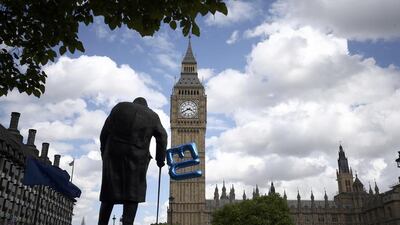Since Britain’s unexpected vote to leave the European Union just over a month ago, much of the reaction and commentary has ranged from cool analysis to overdramatic hand-wringing. Nearly all of it has concerned what this means for the United Kingdom.
What, however, of the EU itself: how will the union react to the biggest blow in its history?
The continent stands divided and, although it may seem as though nothing needs to change instantly – and indeed, it probably won’t until Germany, France and Holland hold elections next year – there are two very different paths that the EU can now follow.
Brexit can be seen as a form of very unpalatable but necessary advice from the doctor. Will the patient heed the guidance, and make the crucial lifestyle change? Or will the bad behaviour continue, leading inexorably towards grisly complications, possible amputations and even a fatal collapse?
Europe cannot stand still. The battle is already brewing between those who think the EU must become much looser, more accountable and do far less, and those who insist that whatever the calamity, “more Europe” is always the answer.
The danger is that the latter, who are responsible for what the US economist James K Galbraith calls a “technocratic dictatorship” that has led to a “gridlocked, reactionary, petty and vicious” EU, will win out. Heedless of the fact that, even in core countries such as France where, as a recent Pew Global Attitudes Survey found, only 38 per cent of the population now view the EU project favourably, these Eurofanatics think even greater integration is the solution.
On the very day that Britain voted, for instance, Spanish foreign minister José García-Margallo wrote an article titled Whatever happens, more Europe.
Mr Garcia-Margallo is far from alone. Indeed, his attitude appears to be institutionalised in the halls of Brussels and Strasbourg and in the palaces dedicated to a European dream that has turned into a nightmare for member states such as Greece.
What is unusual about the Brexit referendum is that the EU did not ask the people of Britain to vote again, as – possibly in some fit of absent-mindedness – they had obviously given the wrong answer. This is what happened when Ireland rejected the Treaty of Nice in 2001. Have another go, said the EU, and the following the year, having been tossed a few sweeties, the Irish said yes. Similarly, the Danes voted against the Maastricht Treaty in 1992, but were persuaded to say yes the following year.
Even at times that the EU does accept that “no means no”, as when the French refused to accept the proposed European constitution in 2005, the Eurofanatic elite manage to get their way all the same. As the constitution’s author, former French president Valery Giscard d’Estaing, brazenly admitted in a newspaper letter, “the institutional proposals of the constitutional treaty ... are found complete in the Lisbon Treaty, only in a different order and inserted in former treaties”. The Irish also voted against Lisbon to begin with, before being allowed another chance, when – bingo! – they said yes.
This unusual view of the democratic process is taken one step further in the European Commission – a bureaucracy that has transformed itself into the EU’s self-proclaimed executive. No one voted for this startling change from public servant to master. Indeed, the process has been so mysterious that when I asked one long-standing MEP how it had happened, he answered: “No one seems to know.”
All of this is personified in Jean-Claude Juncker, the president of the commission. If he were just a buffoon – and he has been filmed enthusiastically slapping the cheeks of EU leaders, calling the prime minister of Hungary, Viktor Orbán, a “dictator”, and forcing one minister to crane his neck so Mr Juncker could plant a kiss on his bald pate – that would be one thing. But Mr Juncker – who, like the commission, no one has voted for – presumes to tell member states how to behave. He acts with the presumption of a mandate when he has none.
The Eurofanatics do not feel the need for popular support or a democratic mandate to pursue what Donald Tusk, the president of the European Council, has called their “utopia of Europe without nation states, a utopia of Europe without conflicting interests and ambitions, a utopia of Europe imposing its own values on the external world”. They just believe it; and they know best.
Mr Tusk is elected by national leaders. In the same speech earlier this year he also noted: “Increasingly louder are those who question the very principle of a united Europe. The spectre of a break-up is haunting Europe and a vision of a federation doesn’t seem to me to be the best answer to it.”
He was right. A Europe which justifies all of its directives from scratch. One that does only what it really needs to do in terms of free trade, and one that respects the wishes of its individual peoples, who clearly do not wish to dissolve their nations into a European superstate. That would be an EU that Britain would never have voted to leave.
The EU’s leaders must choose between these visions. Less Europe will enrage the fanatics. But they are the ones who caused the groundswell of anger at their beloved ideal. Why follow their vision of “more Europe”? The EU has a chance to save itself. If it does not, few tears will be shed over the fall of an unelected, hubristic elite, and the wreckage of the grandiose architecture they built to rule over peoples whose aspirations they regarded as inconsequential.
Sholto Byrnes is a senior fellow at the Institute of Strategic and International Studies, Malaysia


